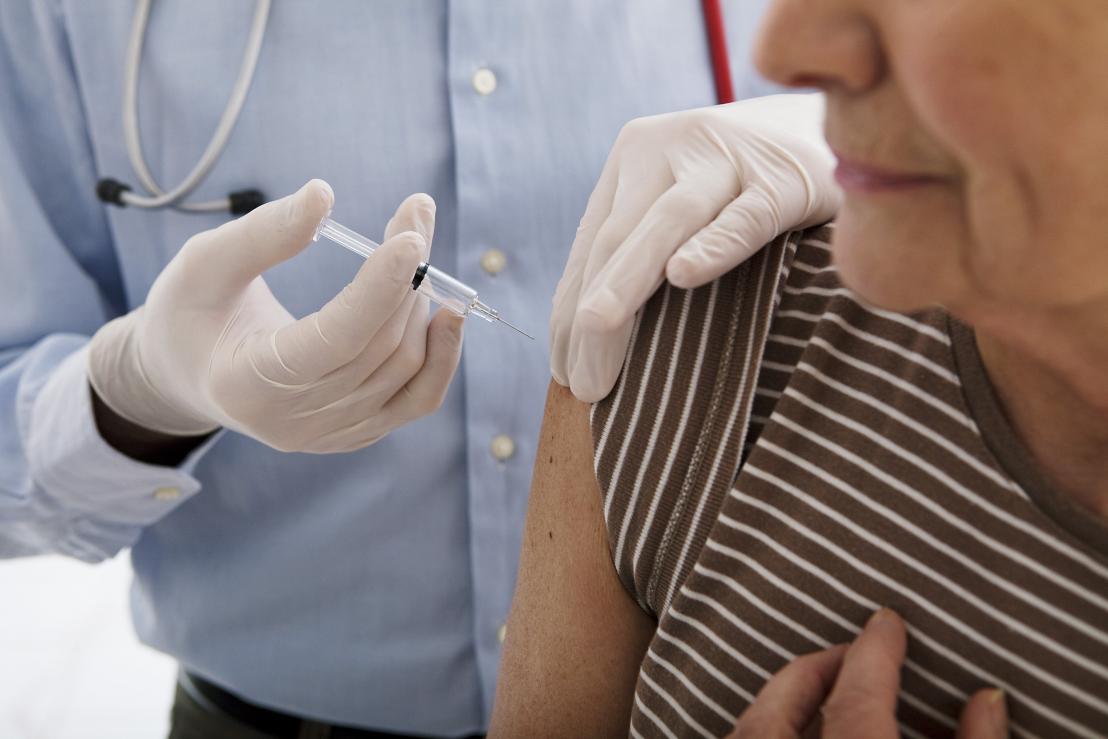Vaccines are much less effective in the elderly than they are in the young, making people far more susceptible to serious infection as they age – a fact that became widely apparent during the Covid-19 pandemic.
Why vaccine potency wanes is poorly understood and scientists are on a quest to develop a new generation of vaccines and vaccination strategies that offer strong protection throughout our lives.
Scientists need to grasp why a person’s natural fightback to an invading microorganism becomes blunted with age in a process known as immunosenescence.
‘We know the immune system changes with age, and that this has huge consequences on health and age-related deterioration,’ said Debbie Van Baarle, professor of immunology of vaccinations at the University Medical Centre Groningen and the Centre for Infectious Disease Control in the Netherlands. ‘But the extent and precise nature of these changes, and what we can learn to improve vaccines is largely unknown.’
‘With more information, we could make vaccines a better fit for every patient, at every stage of life.’
Immunosenescence
The human immune system is immensely complex, with a raft of specialist molecules and cells working in concert to fight infection and return the body to a state of equilibrium (known as homeostasis) after a bout of ill-health. How this interplay of cells and molecules changes with age underpins the work of immunosenescence researchers.
Prof Van Baarle is scientific lead of VITAL, an Innovative Medicines Initiative project which provides evidence-based knowledge to develop targeted and efficient vaccination strategies for older adults. Researchers hope to understand what factors hamper people’s immune responses as they age.
‘If we discover that a certain part of the immune system doesn’t respond so well to vaccines after a certain age, then we’ll need to ask questions around this,’ said Prof Van Baarle.
‘For instance, should we be priming the immune system at an earlier age, when it is still fit?’ she said. ‘Should we be using different vaccine technology for older people or different vaccine adjuvants (substances added to a vaccine to evoke an immune response) for people in a certain age group?’
Improving immune response
As part of Prof Van Baarle’s study, volunteers aged 25-90 donated blood samples after receiving the influenza and then the pneumococcal vaccine. Researchers are analysing these samples, observing the immune response at multiple levels and searching for patterns in age-related changes to the molecules (e.g., antibodies) and cells (some of which produce antibodies) that are most critical to a person’s immune response.
‘We are looking for factors that can be used to identify people who respond less well to regular vaccination, so we know who may need a different way of being vaccinated,’ said Prof Van Baarle.
Tailored vaccines
‘In a perfect world, health systems will one day offer a tailored vaccine service where you will go to your family doctor, and they will say, “How old are you?”’ said Prof Van Baarle. ‘“What are your comorbidities? What is your immunological profile? What is your lifestyle risk profile?”’
Based on this information, a doctor in this ideal future will decide on a vaccine protocol that best fits the needs of an individual.
The VITAL team are also investigating the economic impact of the current management of infectious diseases in ageing adults, and will develop mathematical tools to predict how these costs might change when preventative measures (such as new vaccines) are taken.
These tools will be available to policymakers to determine the readiness of the population for a given infection, including a new pandemic. It will also help to improve preparedness. The goal is for each nation to reach maximum gains in health outcomes given their healthcare budgets and demographic trends.
Today, every European country sets its own agenda for administering vaccines. For instance, some countries invite people aged 60+ for a booster to their varicella-zoster vaccine, to lower the risk of them developing shingles.
‘But whatever a country decides is the best policy for vaccinating its people, its decisions should be based on scientific data and its communication with medical practitioners and patients should be robust,’ said Prof Van Baarle.
Druggable targets
The ImmunoAgeing project is looking at factors responsible for immunological unresponsiveness in the elderly. The researchers want to identify ‘druggable targets’ within the body – that is, cells or molecules that can either be suppressed or boosted to confer greater immunity in the elderly.
‘The main goal of our research is to alleviate the negative effects of ageing on the immune system and to promote good ageing,’ said Prof Cucca – coordinator of ImmunoAgeing and a medical geneticist at the University of Sassari in Sardinia, Italy. ‘By identifying links between specific (immune system) cell types, diseases, and genes, we can find ways to help older people respond better to pathogens.’
Cucca’s team is also investigating two biological phenomena known to increase with age and undermine health: autoreactivity (where a person’s body launches an immune response against its own cells or tissues) and inflammaging (a chronic, low-grade inflammation with no known cause).
‘Overall, the nature of all these changes experienced with advancing age, and their underlying genetic and biological causes, are still largely unknown,’ said Prof Cucca. ‘We aim to understand how specific immune cells and molecules relate to the functional competence of the immune system and the genetic and non-genetic factors that drive these changes.’
A first round of analysis yielded promising results as the researchers identified 16 immune-system molecules as “druggable targets” to offer greater immunity in the elderly. As research continues, 12 of these may be treatable with drugs already being used to treat other unrelated conditions.

